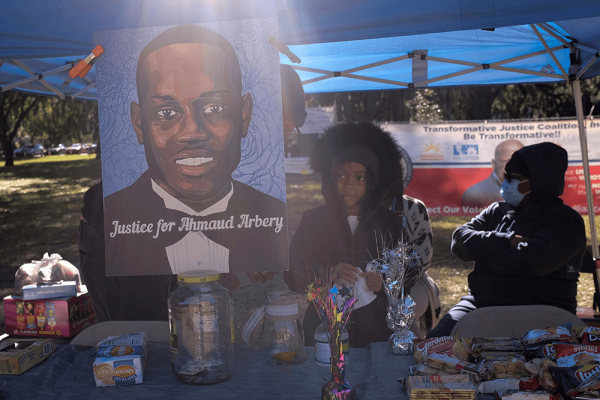A judge sentenced a white father and son to life in prison and their neighbor to 35 years on Monday for a federal hate crime in the 2020 murder of Ahmaud Arbery, a Black man shot after jogging in a suburban Georgia neighborhood in a case exemplifying racist violence and vigilantism in the United States.
Travis McMichael, a 36-year-old former U.S. Coast Guard mechanic, his father Gregory McMichael, a 66-year-old former Glynn County police officer who later worked for the local prosecutor’s office, and William “Roddie” Bryan, a 52-year-old mechanic, were sentenced in the coastal city of Brunswick.
The three already are serving life sentences after being convicted of murder in a state trial last November, with only Bryan given the possibility of parole. All three then were convicted in February of federal charges of violating Arbery’s civil rights by attacking him because of his race and of attempted kidnapping, with the McMichaels also found guilty of a firearms charge.
They were sentenced on the federal charges in separate hearings on Monday by U.S. District Judge Lisa Godbey Wood. In handing down the younger McMichael's sentence first, Wood said widely seen cellphone video of him shooting Arbery, 25, at close range with a shotgun was seared into her memory.
“You acted because of the color of Mr. Arbery’s skin,” the judge told McMichael, who looked ashen as the sentence was pronounced.
Gregory McMichael, testifying before he was sentenced, told Arbery’s family he prayed for “God's peace” to come to them.
“The loss that you've endured is beyond description,” he said as some of Arbery’s relatives wiped away tears in a crowded courtroom that included civil rights leader Jesse Jackson. “I’m sure that my words mean very little to you, but I want to assure you I never wanted any of this to happen. There was no malice in my heart or my son’s heart that day.”
He apologized to his son, who declined his own chance to testify, and to his wife, who began sobbing, but did not explicitly apologize to Arbery’s family.
The judge said Bryan deserved a shorter sentence than the McMichaels because he did not bring a gun to the chase.
Bryan later told the court: “I’m glad to finally have the chance to say to Arbery’s family and friends how sorry I am for what happened to him on that day.”
‘Three devils’
Marcus Arbery, Ahmaud Arbery’s father, told the court during the first hearing: “These three devils have broken my heart into pieces that cannot be found or repaired.” Referring to Travis McMichael, he added: “You hate Black people.”
“I struggled to come to the realization that a father could actually accompany his son to take a life,” Wanda Cooper Jones, Arbery’s mother, told the second hearing in urging a life sentence for Gregory McMichael.
Arbery’s case is one in a series of killings of Black people in recent years that have drawn attention to the issue of racism in the U.S. criminal legal system and law enforcement. It also highlighted the broader issue of U.S. gun violence.
Arbery, an avid jogger and fitness buff, was running through the leafy, mostly white Satilla Shores neighborhood, near Brunswick, on a February 2020 afternoon when the McMichaels decided to grab their guns, jump in a pickup truck and give chase. Their neighbor Bryan joined the chase in his own pickup truck and pulled out his cellphone to record Travis McMichael firing a shotgun at Arbery at close range. Arbery had nothing on him besides his running clothes and sneakers.
The video emerged months later, prompting anti-racism protests in many U.S. cities because the three men had not been arrested after a local prosecutor concluded the killing was justified.
The McMichaels had said they believed that Arbery appeared suspicious, speaking of a series of neighborhood break-ins. No evidence ever emerged connecting Arbery to any Satilla Shore thefts.
The three were convicted in state court of murder, aggravated assault, false imprisonment, and criminal intent to commit a felony, with a jury rejecting self-defense claims. They have appealed.
Both McMichaels sought to be transferred out of the state prison system into a federal prison they perceived as safer. Wood said the rules require that they return to the state prison system where they already are serving life sentences.
A lawyer for the younger McMichael, Amy Lee Copeland, said he has received death threats.
“This case involves at least in part concerns of vigilante justice,” she told the court. “I realize the rich irony, judge, in expressing my concern that my client will face vigilante justice himself.”
Got something to say about what you're reading? We value your feedback!




